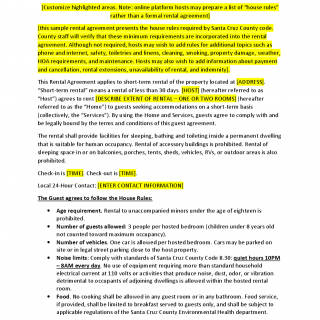Short-Term Rental Agreement
A Short-Term Rental Agreement is a form that outlines the terms of renting a property for a short period, typically ranging from a few days to a few months. This agreement is commonly used for vacation rentals, short-term business stays, and any other temporary dwelling arrangements.
The Short-Term Rental Agreement typically consists of several parts, including:
- Property Details: The address of the property that is being rented, along with any specific information regarding the unit or property.
- Rental Period: The start and end date of the rental period, along with the specific times for check-in and check-out.
- Payment Details: The total rental price, any deposits or fees required for the rental, and the payment schedule.
- Guest Details: The name and information of the person or group that will be occupying the rental property.
- Rules and Restrictions: Any specific rules or restrictions related to the use of the property, such as no smoking, no pets, or restrictions for gatherings or events.
- Liability: Details related to who is liable for any damages or losses that may occur during the rental period.
A Short-Term Rental Agreement is drawn up by the property owner or property manager when they are renting their property for a short period. The parties involved in the agreement are typically the property owner or property manager and the tenant or guests who will be staying in the rental property.
When compiling a Short-Term Rental Agreement, there are a few key features that should be taken into account. It's crucial to clearly outline the rental period, rental price, payment schedule, and rules or restrictions related to the use of the property. The agreement should also specify any specific damages or conditions that might cause a tenant to lose their deposit.
The advantages of a Short-Term Rental Agreement are that it provides a clear understanding of the rental terms and helps prevent disputes between the tenant and property owner or manager. Additionally, a Short-Term Rental Agreement can help protect the property owner's property from damage or misuse.
If the Short-Term Rental Agreement is filled out incorrectly or unclearly, it can result in legal problems for both the tenant and property owner. For example, if the terms of the rental are not clearly outlined, the tenant may be confused about their obligations or what is expected of them. Additionally, if the agreement is not legally binding, the property owner may have difficulty enforcing it in case of a dispute. Therefore, it's important to be thorough and clear when completing a Short-Term Rental Agreement.

